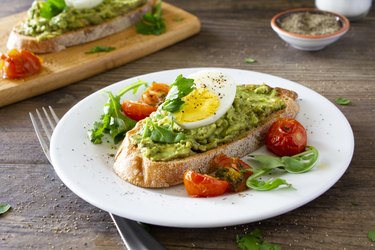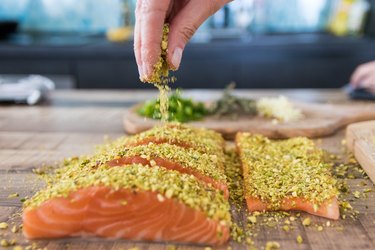
We've all heard the saying that breakfast is the most important meal of the day, but how true is that, exactly?
It turns out that breakfast is pretty darn important — for your sleep, that is. Kickstarting your day with a nutrient-packed breakfast has loads of health benefits, and if you're someone who struggles with getting enough quality sleep, you're going to want to pay attention.
Video of the Day
Video of the Day
The Breakfast Sleep Doctors Recommend and Why
There's an undeniable link between what you eat and the quantity and quality of your sleep, according to the National Sleep Foundation (NSF). Their general recommendation is a high-fiber diet rich in fruits, vegetables, whole grains and lean proteins and low in sugar and saturated fats.
In short: Following this eating pattern may help you fall into a deep, restorative sleep and prevent you from waking up throughout the night, the NSF says.
We spoke to sleep medicine doctors who had similar recommendations (and it all starts with your first meal of the day).
"I recommend breakfasts that incorporate vegetables, fruits, healthy fats and anti-inflammatory nutrients while being lower in saturated fats," says Chester Wu, MD, a board-certified sleep medicine doctor in Houston.
Based on this advice, a healthy breakfast for sleep could include oatmeal (or overnight oats), smoothies, whole-grain cereals, eggs and more. There isn't just one single food or meal that will transform your sleep cycle, Dr. Wu says, so he emphasizes the importance of following a healthy overall diet.
If you're looking for inspiration, here's a sleep healthy breakfast idea for you: avocado toast made with whole-grain bread and topped with tomatoes and egg.
Here's why sleep experts recommend this wholesome breakfast.
1. It’s Rich in Nutrients That Support Sleep Health
Some nutrients are better for sleep health than others. For example, melatonin makes you feel sleepy while magnesium helps your muscles relax, per Northwestern Medicine.
"The lack of key nutrients — such as calcium, magnesium and vitamins A, C, D, E and K — in the diet is associated with various sleeping problems," says Dany Elsayegh, MD, a board-certified sleep medicine physician in Staten Island, New York, pointing to an October 2019 analysis in Nutrients.
Dr. Elsayegh recommends following the DASH diet. This fiber-rich, low-sodium eating plan is typically geared toward people with high blood pressure, but it can also encourage better sleep quality, he says.
Fortunately, this avocado toast recipe is full of many of these nutrients. Avocados are a good source of magnesium, which makes them a good food choice for better sleep, notes the Cleveland Clinic. Avocado is also a good source of magnesium and vitamins C, E and K, notes the USDA.
The tomatoes on top provide antioxidants like vitamins A, C, E and K, per the USDA, while the egg provides vitamin D, according to the USDA.
Eggs and avocados are also a good source of B vitamins, another group of nutrients that support healthy sleep. Along with magnesium and melatonin, B vitamins have been shown to improve insomnia, according to an August 2019 study in the Macedonian Journal of Medical Sciences.
2. It Provides Fiber and Complex Carbohydrates
You can't make avocado toast without toast, and this breakfast idea calls for whole-grain bread. Whole-wheat toast is often recommended as part of a sleep-healthy diet because it triggers the release of the sleepy hormone serotonin, says Dr. Elsayegh.
Fiber is a type of complex carbohydrate that can also affect your sleep. High-fiber intake is linked to deeper, more restorative sleep and is generally recommended for those who struggle with poor sleep, according to a January 2016 review in the Journal of Clinical Sleep Medicine.
The body is the most insulin-sensitive in the morning, making it the perfect time to load up on complex carbohydrates filled with fiber, per the Cleveland Clinic. So, whole-wheat toast for breakfast is looking pretty good. Let's also not forget that avocado and tomato also provide some fiber.
3. It’s Low in Saturated Fat
A diet low in saturated fat is recommended for overall health, but it's especially beneficial for heart health. And research suggests minimizing your intake of saturated fats can also have positive effects on your sleep, allowing you to get deeper sleep and rouse less frequently.
Both Dr. Wu and Dr. Elsayegh recommend keeping your saturated fat intake low in general, but especially at breakfast.
"Diets rich in fiber, fruits, vegetables and anti-inflammatory nutrients, while being lower in saturated fats, are associated with better sleep quality," Dr. Wu explains, pointing to a June 2022 review in the Journal of the Academy of Nutrition and Dietetics.
He recommends following a Mediterranean-style diet that's naturally lower in saturated fat.
So, what exactly does saturated fat do to your sleep cycle? It can cause low-quality sleep by reducing how deeply you sleep and how long you sleep for, according to a July 2023 study in the Journal of Health, Population and Nutrition.
Some breakfast foods, such as bacon, sausage and pastries, are typically high in saturated fat, but avocado toast isn't. Eggs and avocado do contain some saturated fat, but they're mainly a good source of healthy fatty acids, which can actually induce better sleep quality, per a May 2016 study in the Western Journal of Nursing Research.
4. It’s Low in Sugar
What do common breakfast foods like donuts, cereal and pancakes all have in common? They can be high in added sugars.
There's nothing wrong with enjoying sugary foods in moderation, but sleep experts say it's not ideal to load up on sweets first thing in the morning.
"Breakfast foods filled with sugar will lead to a rapid rise then subsequent decline in blood glucose levels," Dr. Elsayegh says. "This decline promotes daytime sleepiness and leads to poor sleep quality."
What's more, opting for junk food at breakfast can hinder your chances of getting deep sleep, according to Harvard Health Publishing.
To energize your morning, opt for a combination of protein and complex carbohydrates. To wake you up in the morning without the sugar rush (and crash), foods like whole grains and eggs can start your day off on the right track, notes Northwestern Medicine.
The Bottom Line
Your eating habits and food choices can affect your sleep. There are many reasons why people skip breakfast, but this does your sleep hygiene a disservice.
"Skipping breakfast completely deprives your body of essential nutrients, which leads to increased stress hormones," Dr. Elsayegh says. "These stress hormones can alter our circadian rhythm and cause poor sleep quality."
Making sure you eat breakfast is only half the battle. You also need to serve up a meal that increases your energy while ensuring your evening sleep is up to par.
After speaking with sleep medicine doctors, it's clear that complex carbs (especially fiber), lean protein, healthy fats, antioxidants and certain minerals are key for getting better sleep.
Toasting up a piece of whole-wheat bread, smearing on avocado and topping with tomato and egg is one way to check all these boxes.
- National Sleep Foundation: “The Link Between Nutrition and Sleep”
- Nutrients: “Micronutrient Inadequacy in Short Sleep: Analysis of the NHANES 2005–2016”
- Cleveland Clinic: “6 Foods That Help You Sleep”
- Macedonian Journal of Medical Sciences: "The Effects of Magnesium - Melatonin - Vit B Complex Supplementation in Treatment of Insomnia"
- Northwestern Medicine: “Eats to Help You Sleep”
- MyFoodData: “Avocados”
- MyFoodData: “Tomatoes”
- MyFoodData: “Hard Boiled Eggs”
- Journal of Clinical Sleep Medicine: "Fiber and Saturated Fat Are Associated with Sleep Arousals and Slow Wave Sleep"
- Cleveland Clinic: “Is Breakfast Important”
- Journal of the Academy of Nutrition and Dietetics: "Diet Composition and Objectively Assessed Sleep Quality: A Narrative Review"
- Harvard Health Publishing: "Eating junk food may affect deep sleep"
- Journal of Health, Population and Nutrition: "The association between cholesterol/saturated fat index (CSI) and quality of sleep, and circadian rhythm among overweight and obese women: a cross-sectional study"
- Western Journal of Nursing Research: "Dietary Macronutrients and Sleep"
- Northwestern Medicine: “Jump Start Snacks”
Is this an emergency? If you are experiencing serious medical symptoms, please see the National Library of Medicine’s list of signs you need emergency medical attention or call 911.


